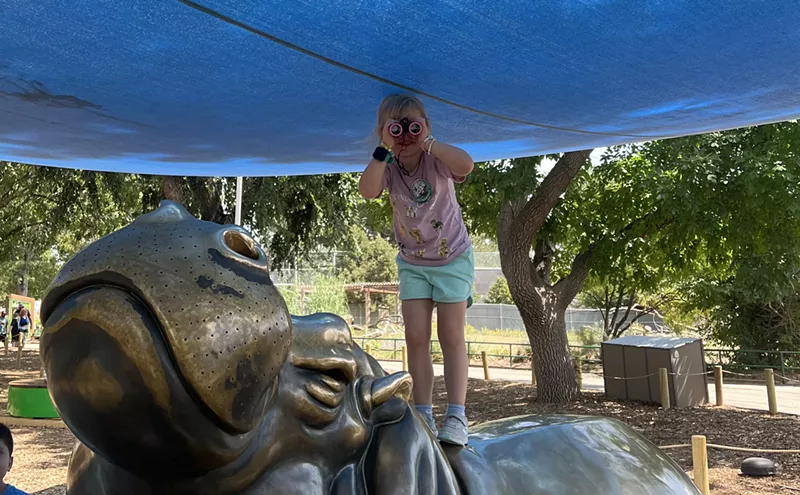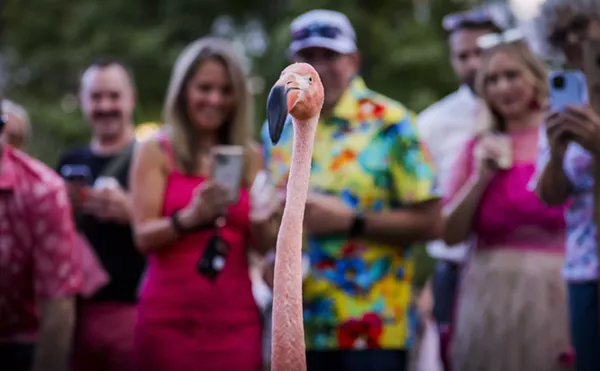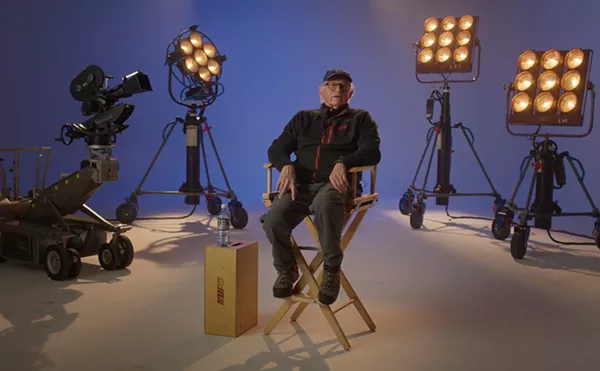Sadly, the problems in As You Like It begin before the play does, as several actors strike up a lame, amateurish pre-show game with a couple of audience volunteers (one of whom, at a recent performance, didn't look too happy at being unceremoniously pawed and dip-kissed). Worse, the play's major shift in venue -- from stuffy English court to lusty Arden -- is achieved by a group of floppy-hatted leprechauns who twirl about to recorded flute music while moving several clunky platforms. When they're finished locking down the many sets of casters, Arden looks like, well, a bunch of foot-high platforms with large, ugly gaps between them. And even though small metallic trees dot each plywood box, the environment hardly complements a story about nature's power to overcome false fronts and man-made artifice. In fact, the industrial-sterile setting has quite the opposite effect, as do several folk songs performed with recorded accompaniment rather than an onstage guitar or lute. Instead of appearing to be inspired by the natural setting and integral to the love story, the songs, which are delivered cabaret-style, seem tacked on and intrusive.
The setting and concept also seem to have hemmed in the performers, who have an understandably hard time establishing any sense of intimacy or character progression -- qualities that are needed to spark the many romantic dalliances, give life to the witty dialogue and show nature's transforming influence over human behavior. The one-foot-high platforms turn the Act Two wooing scene between Rosalind and Orlando into the wrong kind of steeplechase. The court jester, Touchstone, winds up resorting to inflated gestures and a haughty dialect rather than delivering his verbal stilettos with sharp precision, and his famous, hilarious line sequence near the end of the play has been inexplicably cut. The philosopher, Jaques ("All the world's a stage..."), starts out on a false note and never recovers: When he first enters, he's supposed to gather some singing woodsmen into a circle by crooning a mock verse of a tune they've just completed and then telling them that his version is an ancient charm used to call fools into a circle. But the woodsmen remain planted on the many platforms and never move, so the episode earns nary a laugh and Act One ends with dead silence.
Because a pair of rustic lovers, Silvius and Phoebe, manifest but one human quality each, they prove more annoying than endearing. The lovable character of William is reduced to a fleeting caricature, Sir Oliver Martext has been cut altogether and the deus ex machina appearance of Hymen is as overblown and precious as possible. Plus, the minor character of Jacques de Boys -- Orlando and Oliver's brother -- is folded into the role of the prancing LeBeau. (What's more ridiculous: Seeing a long-lost brother show up at the end of the play or listening to a foppish functionary report hearing what the brother would have revealed had he been there in person?)
The evening's few saving graces are designer Janice L. Benning's exquisite costumes, Alphonse Keasley's fine performance as a pair of polar-opposite dukes, Timothy Carter's noble turn as Orlando and Sarah Lauren Fallon's equally heroic attempt to bring Rosalind to full flower. To her credit, she manages to cut through the layers of artifice when delivering the famous epilogue. Finally unencumbered by directorial pretension, Fallon touches our hearts as she should have been free to do at the outset. Like many of the CSF's efforts in recent years, though, her laudable effort proves too little, too late.











